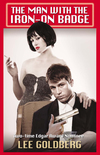 V-life, the glossy magazine produced by Variety, recently published an excerpt of FAN-TAN, the posthumous pirate novel written two decades ago by Marlon Brando and Donald Cammell. It’s about an obese, gluttonous pirate named Anatole "Annie" Doultry, a thinly-veiled version of Brando himself . Here’s an example of the gloriously bad writing:
V-life, the glossy magazine produced by Variety, recently published an excerpt of FAN-TAN, the posthumous pirate novel written two decades ago by Marlon Brando and Donald Cammell. It’s about an obese, gluttonous pirate named Anatole "Annie" Doultry, a thinly-veiled version of Brando himself . Here’s an example of the gloriously bad writing:
Whether stuffed to the brim or an aching pit of nothingness, this man’s stomach was the mother of most of his behavior and his genitalia the father of the rest in Yummee’s opinion. Remember that his was a behavior that almost everyone exposed to it considered entirely predictable and you may appreciate how shrewd she was.
Here’s another example:
She looked like she would hit him again, but she was satisfied with Annie’s flinch and redirected her violence into words. They came squirting out of that angelic mouth, their brakes shot to shit and screeching in protest, flecks of pearly saliva speckling his face like sulphurous dew.
The words squirted out of her angel’s mouth like a car with bad brakes and landed like dew on his face? Yeah, I can see that.
He took the opportunity now to ooze past her — his belly caressing her bounteous breasts — into the room, the familiar room.
Why is it in bad novels, breasts are always bounteous or pendulous or hefty?
A large, languorous finger landed like a butterfly on the peachy thigh in the cleft of her cheongsam.
"Keep yo dirty hands off me," she whispered.
"My little Princess." The fingers, scrupulously scrubbed for the occasion, each nail honed and polished, did their dirty work.
"My little Yummee. I missed you. I missed you a lot. I missed the way you smell. Y’know, I never met a girl that smelled as nice as you. When I was down there in Java, I looked all over for that perfume. I couldn’t find it. I realized it wasn’t perfume. It was just you. Yummee, tell me something nice. I just sailed two thousand miles to hear it and I’m a tired man."
(Pause here: the heavy butterflies grown heavier but still softer, the
plump little woman standing motionless with his hand invisible, buried
to the elbow’s crotch in the cheongsam’s cleft, expressly invented in
H0ng Kong for these purposes)
Pause here: If the heavy butterflies of Brando’s languorous fingers weren’t all over this manuscript, it would never have been published except, perhaps, by PublishAmerica, expressly invented in hell for these purposes.
 My author’s copies of THE MAN WITH THE IRON-ON BADGE arrived today. There is nothing like opening that box and seeing all those copies of your book. Unlike seeing your writing credit on TV, it’s a moment that never loses its charge. When you can take that book out of the box and stick it on your shelf, that’s when it all becomes real.
My author’s copies of THE MAN WITH THE IRON-ON BADGE arrived today. There is nothing like opening that box and seeing all those copies of your book. Unlike seeing your writing credit on TV, it’s a moment that never loses its charge. When you can take that book out of the box and stick it on your shelf, that’s when it all becomes real. 



